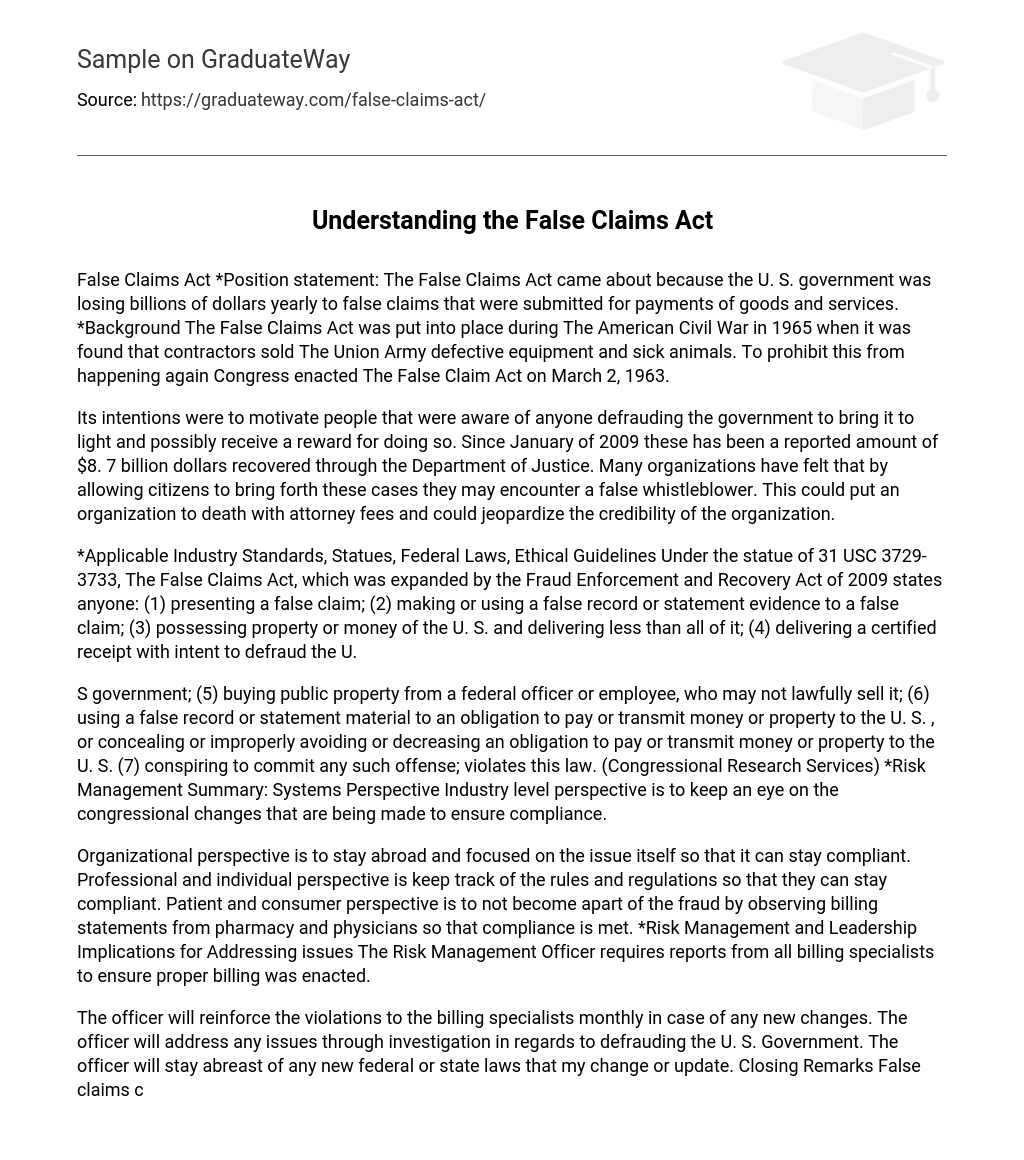False Claims Act *Position statement: The False Claims Act came about because the U. S. government was losing billions of dollars yearly to false claims that were submitted for payments of goods and services. *Background The False Claims Act was put into place during The American Civil War in 1965 when it was found that contractors sold The Union Army defective equipment and sick animals. To prohibit this from happening again Congress enacted The False Claim Act on March 2, 1963.
Its intentions were to motivate people that were aware of anyone defrauding the government to bring it to light and possibly receive a reward for doing so. Since January of 2009 these has been a reported amount of $8. 7 billion dollars recovered through the Department of Justice. Many organizations have felt that by allowing citizens to bring forth these cases they may encounter a false whistleblower. This could put an organization to death with attorney fees and could jeopardize the credibility of the organization.
*Applicable Industry Standards, Statues, Federal Laws, Ethical Guidelines Under the statue of 31 USC 3729-3733, The False Claims Act, which was expanded by the Fraud Enforcement and Recovery Act of 2009 states anyone: (1) presenting a false claim; (2) making or using a false record or statement evidence to a false claim; (3) possessing property or money of the U. S. and delivering less than all of it; (4) delivering a certified receipt with intent to defraud the U.
S government; (5) buying public property from a federal officer or employee, who may not lawfully sell it; (6) using a false record or statement material to an obligation to pay or transmit money or property to the U. S. , or concealing or improperly avoiding or decreasing an obligation to pay or transmit money or property to the U. S. (7) conspiring to commit any such offense; violates this law. (Congressional Research Services) *Risk Management Summary: Systems Perspective Industry level perspective is to keep an eye on the congressional changes that are being made to ensure compliance.
Organizational perspective is to stay abroad and focused on the issue itself so that it can stay compliant. Professional and individual perspective is keep track of the rules and regulations so that they can stay compliant. Patient and consumer perspective is to not become apart of the fraud by observing billing statements from pharmacy and physicians so that compliance is met. *Risk Management and Leadership Implications for Addressing issues The Risk Management Officer requires reports from all billing specialists to ensure proper billing was enacted.
The officer will reinforce the violations to the billing specialists monthly in case of any new changes. The officer will address any issues through investigation in regards to defrauding the U. S. Government. The officer will stay abreast of any new federal or state laws that my change or update. Closing Remarks False claims can be submitted intentionally or accidentally. What makes the difference is the policies and procedures that have been implemented. In the event an organization is faced with this crime it will impair the whole organization no matter if you win or lose.
Quality is of the essence in any organization but with peer reviews and feedback on the personnel you could possibly avoid this altercation. References: Doyle, C. (2009) Qui Tam: The False Claims Act and related statues. Congressional Research Service. Retrieved April 25, 2012 from Wilmerhale. (2012, January 6). False Claims Act Alert. Retrieved July 20, 2012 from http://www. wilmerhale. com/files/Publication/7652b414-ddc3-4391-8c62-271547aeba20/Presentation/PublicationAttachment/78d081db-ec80-4f2f-9dc0-3ec97c4c14f3/False%20Claims%20Act%202011%20Year-In-Review. pdfhttp://www. fas. org/sgp/crs/misc/R40785. pdf





